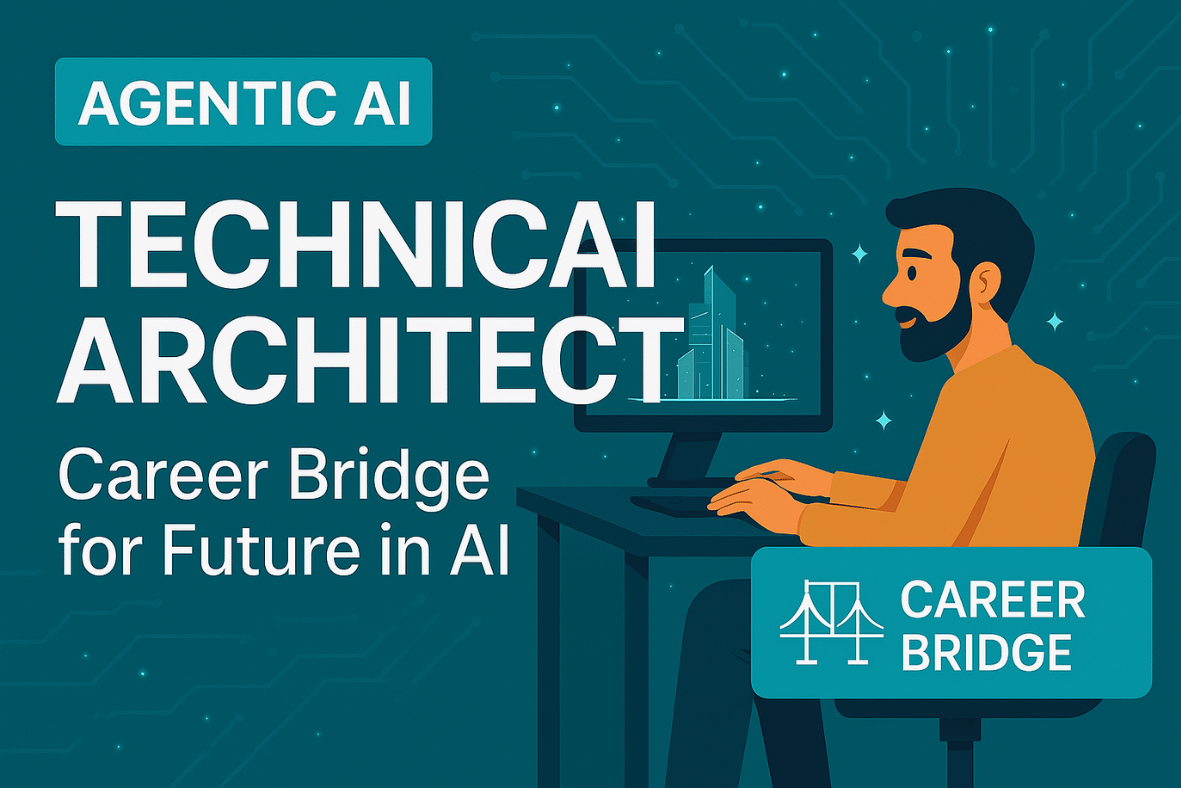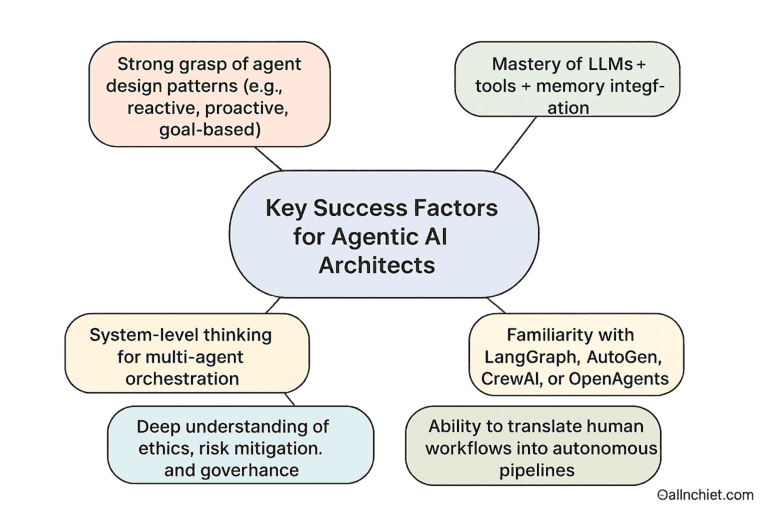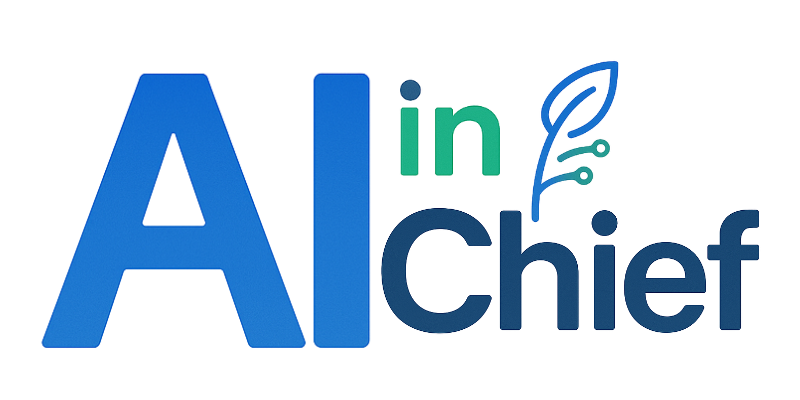Agentic AI Architect's Career Bridge for Future in AI
As AI evolves beyond passive information retrieval into autonomous decision-making, the role of the Agentic AI Architect is emerging as a pivotal career frontier. If you’re looking to architect intelligent systems that act with purpose -this is your future.

🧠 A Successful Agentic AI Architect
An Agentic AI Architect designs systems where AI agents interact, reason, and take autonomous action based on goals, memory, and feedback loops. These aren't just chatbots - they are digital agents that can plan, code, search, delegate, and even self-reflect.
Think of them as architects of "thinking machines" with strategic initiative.
📘 What You Will Learn
In this blog, you’ll discover:
- What defines the Agentic AI Architect role
- Why it's critical in next-gen AI evolution
- Must-have skills, tools, and keywords
- Realistic prep timelines (1 hour to 4 weeks)
- Internship opportunities to gain hands-on experience
🚀 Why This Role Matters in the AI Future
Agentic AI is the foundation for autonomous agents, AI teammates, and self-directed co-pilots in software engineering, marketing, customer support, and beyond.
The world is shifting from:
"Ask a question, get an answer" → "Give a goal, let the AI act."
Agentic AI Architects ensure systems are:
- Safe and reliable
- Capable of long-term planning
- Equipped to use external tools, APIs, and memory
- Scalable across enterprise environments
✅ Key Success Factors for Agentic AI Architects

- Strong grasp of agent design patterns (e.g., reactive, proactive, goal-based)
- Mastery of LLMs + tools + memory integration
- System-level thinking for multi-agent orchestration
- Familiarity with LangGraph, AutoGen, CrewAI, or OpenAgents
- Deep understanding of ethics, risk mitigation, and governance
- Ability to translate human workflows into autonomous pipelines
🧩 Key Responsibilities of an Agentic AI Architect
- Design and deploy multi-agent systems for complex enterprise use cases
- Architect autonomous workflows using LLMs + tools + long/short-term memory
- Integrate agents with APIs, databases, plugins, and RAG systems
- Define fallback mechanisms and constraints for safe operations
- Evaluate agents across trust, hallucination, decision traceability
- Partner with AI/ML engineers, PMs, UX designers to deliver solutions
🧠 Capabilities Needed for the Job
Core Technical Skills
- Deep understanding of LLMs, embeddings, RAG
- Proficiency in LangChain, LangGraph, AutoGen, or CrewAI
- Agent loop design (planning → act → observe → update → repeat)
- Multi-modal agent support (text, vision, code, audio)
Architectural Thinking
- Knowledge of LLMOps and deployment pipelines
- Scalable design for real-time and batch tasks
- Security, compliance, logging, and debugging strategies
Soft Skills
- Systems thinking
- Stakeholder alignment
- Agile collaboration
- Use-case prioritization
🛠️ Top Tools to Learn for Cracking the Interview
| Category | Tools |
|---|---|
| Agent Frameworks | LangGraph, AutoGen, CrewAI, OpenAgents |
| LLM Orchestration | LangChain, LlamaIndex |
| Memory & RAG | Chroma, Pinecone, Weaviate |
| External Tool Use | Function calling, Plugin systems, API orchestration |
| Deployment & Monitoring | FastAPI, Docker, Kubernetes, LLMOps stacks |
📝 Top Keywords for Your CV
To stand out as an Agentic AI Architect, use these:
- “Agent-based LLM orchestration”
- “LangGraph/AutoGen/CrewAI architecture”
- “LLM tool use with dynamic planning”
- “Multi-agent design with goal delegation”
- “RAG + tool use + memory pipeline”
- “Self-reflective agent loop optimization”
- “Deployed agent systems in production”
- “AI governance for autonomous workflows”
🎯 No Experience? Intern With Us!
💡 Want to break into the field?
Join our Agentic AI Architect Internship:
- Build real agent systems using LangGraph or AutoGen
- Get mentored by industry experts
- Work on actual problems in finance, health, and education
- Add certified projects to your portfolio
🔗 Apply today and future-proof your career.
⏱️ Only 1 Hour to Prepare?
Here’s your rapid checklist:
- Read a case study on AutoGPT or LangGraph
- Understand the structure of an agent loop
- Be ready to sketch an agent-based solution for a basic task
- Learn what makes agents different from standard LLM apps
- Prepare to discuss risks of autonomous agents
🗓️ How to Prepare: 1 Day → 1 Week → 4 Weeks
✅ 1 Day
- Understand agentic system architecture and key components
- Read LangGraph docs or explore OpenAgents playground
- Sketch a 2-agent system solving a business use case
🔧 1 Week
- Build a prototype agent using AutoGen or CrewAI
- Integrate a tool use function (search, calculator, email trigger)
- Test planning, memory, and fallback logic
🚀 4 Weeks
- Deploy an agent with persistent memory and external APIs
- Implement RAG + tool use + observability pipeline
- Fine-tune prompts for complex planning
- Showcase your project on GitHub or a personal portfolio site
🌟 Final Thought
The Agentic AI Architect is no longer a futuristic idea - it’s a current and urgent need. These architects don’t just build intelligent systems; they build autonomous collaborators that can reason, act, and evolve.
Whether you're transitioning from ML engineering, DevOps, or product architecture - now is the time to step into the agentic future.
🚀 Ready to take action? Build your bridge. Become an Agentic AI Architect. Start now.

